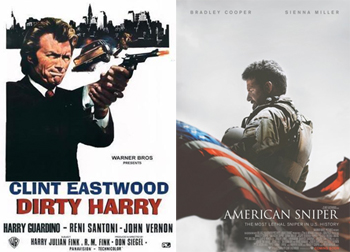In the 1971 film, "Dirty Harry," Inspector Harry Callahan pursues the Scorpio Killer, a psychopath who enjoys torturing and murdering people.
Clint Eastwood plays Harry, who earned his "dirty" handle by dispensing with pesky legal niceties and ignoring his overstuffed superiors.
 With his trusty .44 magnum, Harry summarily delivers the verdict wearing his signature smirk; "Go ahead. Make my day."
With his trusty .44 magnum, Harry summarily delivers the verdict wearing his signature smirk; "Go ahead. Make my day."
For all its hype, "American Sniper," directed by Eastwood, is a bulked up homage to "Dirty Harry."
Bradley Cooper - also bulked up – portrays Navy SEAL Chris Kyle. With his trusty TAC-338 rifle, Kyle pursues a Syrian sniper called "Mustafa," who lays down covering fire for "The Butcher," a sadistic psychopath who enjoys torturing and murdering his victims with a power drill.
Not one for the chain of command, Harry blows off his police chief and the district attorney. Kyle, a non-com, ignores his commanders. On two occasions in the film, Kyle disobeys orders and U.S. soldiers and Iraqi civilians get killed.
Similarly, when Harry goes rogue, the dead bodies that pile up usually include his partners and innocent bystanders. In the respective films, Kyle and Callahan suffer no serious consequences for their insubordination.
Harry corners the Scorpio Killer and let's his .44 do the talking. Kyle kill The Butcher before finally getting a bead on Mustafa, nailing him from a mile away.
Dirty Harry, like American Sniper, was a hit. The difference is that Harry was fictional. Kyle was real - and so was the Iraq war.
After talking to a chair at the 2012 Republican National Convention, Eastwood might be a bit off, but he's still producing boffo box office hits and this time it's a sentimental celebration of God, guns and gore.
Patriotism being the last refuge of a scoundrel, Clint's Iraqi bloodbath is coated with gooey jingoistic icing and topped off by a healthy dollop of old time religion.
Jesus is never far from Chris Kyle, who carries a bible everywhere he goes while sporting a Christian Crusader cross tattoo on his bicep.
In his bestselling autobiography, "American Sniper," on which the movie is based, Kyle wrote, "I don't shoot people with Korans. I'd like to, but I don't," adding, "I loved what I did. I still do…it was fun. I had the time of my life being a SEAL."
Harry Callahan might say the same thing about being a cop.
Like Harry, Kyle is remorseless. He never questions what he is doing or why. When one SEAL does and is later killed, Kyle explains the man's doubts did him in.
After returning home, Kyle tells a counselor he has withdrawn from his wife and family and behaved violently, not because he killed 160 people, but because he couldn't save more American soldiers in Iraq. He remedies this by taking wounded vets to shooting ranges.
One was a former Marine suffering from PTSD who police say shot Kyle dead in 2013. Why did Kyle believe handing a loaded gun to a severely disturbed man was therapeutic?
Eastwood dodges these sorts of thorny questions while re-writing history.
Kyle and his wife watch the Twin Towers collapse on television. Suddenly, Kyle is in Iraq - except Iraq had nothing to do with 9-11. There was no connection between the secular Iraqi dictator Saddam Hussein and the al-Qaida terrorist leader, Osama bin Laden. So why does Eastwood pretend there was?
In "American Sniper," the reason for the invasion - non-existent weapons of mass destruction - is never even mentioned, nor is Dick Cheney's glib assurances of speedy victory and the U.S. being "greeted as liberators."
There is nothing about George W. Bush's "Mission Accomplished" speech; no consideration of the 100,000-plus innocent Iraqi civilians killed in the war; no hint that the Iraq invasion was the bloodiest, costliest blunder an American president ever made.
We rightfully honor the noble sacrifice of the men and women who fought in Iraq. Theirs was not the reason why. But let's also never forget elected politicians who were disastrously wrong sent them there. We owe these heroes what they never got from Bush or Cheney: the unvarnished truth.
So what is Eastwood really up to here? Why is "American Sniper," like the rationale for the Iraq invasion itself, so blatantly dishonest?
Eastwood claims he has no political agenda but, I wonder, is he deliberately whitewashing the ugly facts? Is he attempting to justify an ignoble war that should never have been fought in the first place?
Is Clint Eastwood being a good Republican soldier?
Kevin Foley owns KEF Media Associates, Inc., an Atlanta-based producer and distributor of electronic publicity. He can be reached at [email protected].


 Brunswick Group handles Endeavor, which has launched a review of strategic alternatives at the sports and entertainment combine as CEO Ari Emanuel believes Wall Street undervalues his company.
Brunswick Group handles Endeavor, which has launched a review of strategic alternatives at the sports and entertainment combine as CEO Ari Emanuel believes Wall Street undervalues his company. MWWPR has been retained by SportBLX to lead communications for the launch of a platform that allows fans and investors to own shares of unique assets in sports.
MWWPR has been retained by SportBLX to lead communications for the launch of a platform that allows fans and investors to own shares of unique assets in sports. DraftKings is betting on Donald Trump-connected Ballard Partners to help it achieve its economic development and regulatory relief goals in Washington. (1 reader comment)
DraftKings is betting on Donald Trump-connected Ballard Partners to help it achieve its economic development and regulatory relief goals in Washington. (1 reader comment) On November 15, “Ford v Ferrari” will roar into theaters, packing a publicity boost for two great global auto brands right on the marquee. Here's a Top Ten list of films in which a brand played a starring role. (1 reader comment)
On November 15, “Ford v Ferrari” will roar into theaters, packing a publicity boost for two great global auto brands right on the marquee. Here's a Top Ten list of films in which a brand played a starring role. (1 reader comment) Steven Spielberg’s Amblin Partners has brought on Dan Berger as executive vice president and head of communications.
Steven Spielberg’s Amblin Partners has brought on Dan Berger as executive vice president and head of communications.


 Have a comment? Send it to
Have a comment? Send it to 
No comments have been submitted for this story yet.